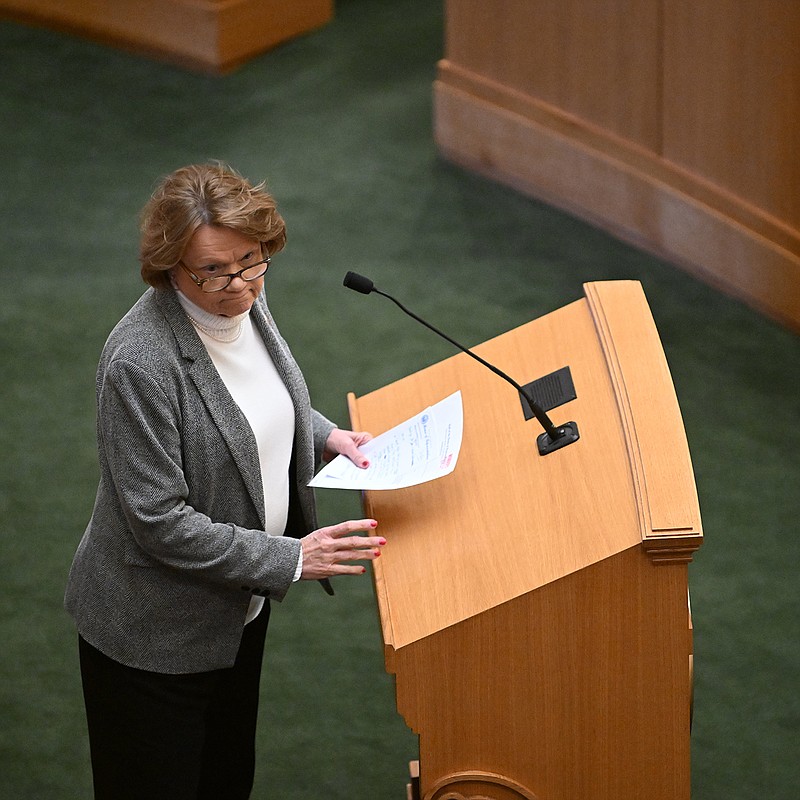Arkansas judges would have access to a court program aimed at increasing the likelihood of family reunification while cutting taxpayer costs in dependency neglect cases under legislation that cleared a state House committee last week.
House Bill 1144, enabling family treatment courts, passed the Committee on Judiciary on Thursday. Sponsored by Rep. Carol Dalby, R-Texarkana, the bill received no audible dissent in a voice vote and will move to the full House for further consideration.
Dalby, who chairs the committee, said family treatment courts are geared toward aiding families that face separation by the state because of substance use or mental health disorders. The court program, which circuit court judges could voluntarily adopt, would run in conjunction with dependency neglect proceedings.
"It's to support the participants, particularly the parents in their parenting roles and to help them become better parents," said Dalby. "There are services for the [...] children in it to support them and help them either remain with their parents or to return to their parents or guardian or custodian."
Along with stabilizing families and providing mental health and substance use treatments, family treatment courts will also aim to help parents enter or stay in the workforce, said Dalby.
All cases in family treatment courts would receive the same level of confidentiality as any other dependency neglect case, said Brooke Steen, juvenile division director with the Arkansas Administrative Office of the Courts.
If signed into law and approved by the state Supreme Court, Dalby's bill would add family treatment courts to the official list of specialty courts available to judges. Among other programs, the state Supreme Court currently oversees specialty courts to address drug use, mental health, veteran treatment and driving while intoxicated cases.
"The sole purpose of each one of these courts, no matter what the topic [...] is to try to keep the individual from being incarcerated," said Dalby, who serves on the state's Specialty Courts Program Advisory Committee. "The whole hope is [...] that those services can be given, that [the] individual can stay out of prison, can stay to work [and] can be a productive citizen of society."
By creating a statewide family treatment court program, Dalby's bill would also expand judges' access to federal grants needed to supplement state funding. While judges have secured dollars from the U.S. Department of Justice to launch pilot programs, Steen said family treatment courts would have to be adopted by the state Supreme Court to allow judges to continue the programs.
The "goals" of family treatment courts, under the bill, should be consistent with the Family Treatment Court Best Practice Standards adopted by the Center for Children and Family Futures and the National Association of Drug Court Professionals, as they existed on Jan. 1.
The best practices were developed following a nationwide review of family treatment courts.
"Any time we build standards we start with a comprehensive review of the literature," said Jacqueline van Wormer, director of research with the National Drug Court Institute, during a Jan. 27 interview.
A meta-analysis published in 2019 found families that participated in family treatment courts were twice as likely to reunify than those that received conventional services. Research also showed that when involved in specialty courts, parents were more likely to complete treatment, and children were less likely to spend time in foster care, said van Wormer.
Since family treatment courts often require weekly or bi-weekly meetings, parents also received more review hearings when participating in specialty courts, she said.
Among other guidance, the best practice standards address the role of the judge, substance use disorder treatment and comprehensive case management.
At least three Arkansas judges are exploring pilot programs for family treatment courts, said Steen.
Judge Adam Weeks, who serves in the 3rd Judicial Circuit encompassing Jackson, Lawrence, Randolph and Sharp counties, said during an interview Friday that he received funding through the U.S. Department of Justice to establish his family treatment court over the next three years.
Weeks decided to pursue the program after finding that most of the dependency-neglect cases passing through his court involved drug use. By using family treatment court best practices, he expected he could double his court's reunification rate for these families.
Benton County Circuit Judge Tom Smith, who is also establishing a pilot program, said he appreciated the collaborative approach encouraged by family specialty courts.
"The best thing we can do is just try to utilize every tool available," he said. "There's no way we want to ever have kids go back to that home if it's not safe. So the more ways we find and the more support we find to help families stay stable long after we're done with the case is our goal."
Under Dalby's bill, family treatment court teams may include: a circuit judge; a program coordinator; a child welfare agency attorney; a court-appointed special advocate; any attorney acting as counsel for a parent, guardian or custodian; an attorney ad litem; a family service worker and one or more treatment providers with experience addressing substance use or mental health disorders.
An attorney from the state Commission for Parent Counsel could also join the team if a child was removed from the family. The bill would also allow circuit court judges to add any other individuals "determined necessary" to their programs.

